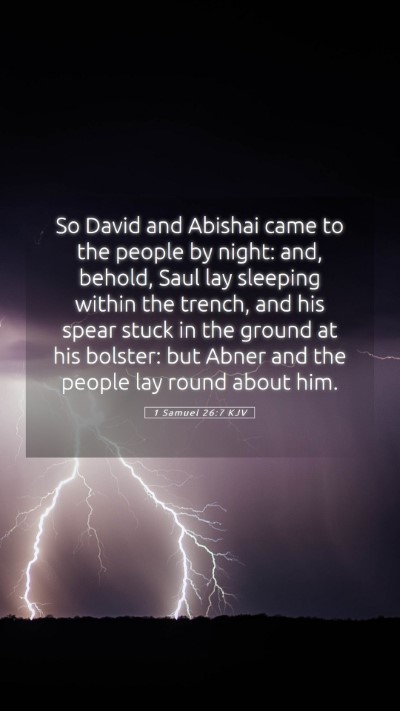Understanding the Meaning of 1 Samuel 26:7
1 Samuel 26:7 states: "So David and Abishai came to the people by night: and, behold, Saul lay sleeping within the trench, and his spear stuck in the ground at his head: but Abishai said to David, God hath delivered thine enemy into thine hand this day: now therefore let me smite him, I pray thee, with the spear even to the earth at once, and I will not smite him the second time."
Bible Verse Explanation
This verse captures a critical moment in the ongoing conflict between David and King Saul. It illustrates the tension of leadership, the pursuit of power, and the presence of divine intervention in human affairs. Abishai's suggestion to kill Saul reflects a common theme of the struggle for survival among leaders during this tumultuous period in Israel's history.
Insights from Public Domain Commentaries
-
Matthew Henry:
Henry emphasizes the significance of this event in the larger narrative of David's rise to power. He notes that David, while having the opportunity to kill Saul, chooses to spare him, illustrating his moral integrity and respect for God's anointed king. This decision exemplifies the principle of divine justice over human impulse.
-
Albert Barnes:
Barnes highlights the strategic and perilous nature of the situation. He points out that David's ability to infiltrate Saul’s camp without detection demonstrates his cunning and the chaotic state of Saul's reign at this time. Barnes notes that the spear beside Saul symbolizes his authority and the threat posed by David's rising popularity.
-
Adam Clarke:
Clarke offers a psychological perspective, delving into the motivations of Abishai and the trust vested in David. He discusses how Abishai’s eagerness to eliminate the threat posed by Saul reflects a common warrior mentality, while also examining David's restraint as a sign of his future kingship, suggesting that righteous leadership involves mercy and wisdom.
Biblical Exegesis and Contextual Analysis
To fully grasp the meaning of 1 Samuel 26:7, it is essential to understand the historical context of the narrative. David is fleeing from Saul, who is jealous of his success and sees him as a rival. This verse is situated in a narrative that explores the themes of betrayal, divine favor, and the moral complexities of leadership.
The nighttime setting emphasizes stealth and danger, a metaphor for the precariousness of David’s situation. The trench and the spear symbolize the barriers of conflict and the tools of power, respectively. David’s decision not to act on Abishai’s proposal reveals his respect for God's law and divine order.
Application of 1 Samuel 26:7 in Daily Life
For modern readers, this passage can be seen as a lesson in leadership and decision-making. In situations of conflict, the temptation to seize immediate power can be strong, but the virtuous path often requires restraint and ethical considerations. David’s example encourages believers to seek wisdom and divine guidance in their actions, embodying the principle of mercy over vengeance.
Cross References
- 1 Samuel 24:4-7: David spares Saul in a similar confrontation.
- 2 Samuel 1:14-16: David reacts to the news of Saul’s death.
- Psalm 54: A psalm of David regarding his deliverance from Saul.
Conclusion
The exploration of 1 Samuel 26:7 through various commentaries reveals rich insights into the nature of power, morality, and divine oversight. By understanding the context and implications of this verse, Bible study groups and individuals engaging in online Bible study can glean valuable lessons on the significance of wise leadership and patience in the face of adversity.
Further Study Resources
- Bible study tools such as concordances and topical Bibles can enhance understanding of difficult passages.
- Engaging with Bible study guides focused on Old Testament narratives can provide deeper insight into the character of David.
- Participating in Bible study lessons that discuss themes of leadership and morality can be beneficial for group discussions.


